|
|
|
Sort Order |
|
|
|
Items / Page
|
|
|
|
|
|
|
| Srl | Item |
| 1 |
ID:
114552
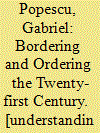

|
|
|
|
|
| Publication |
Lanham, Rowman & Littlefield Publishers, Inc., 2012.
|
| Description |
xi, 183p.Pbk
|
| Standard Number |
9780742556225
|
|
|
|
|
|
|
|
|
|
|
|
Copies: C:1/I:0,R:0,Q:0
Circulation
| Accession# | Call# | Current Location | Status | Policy | Location |
| 056794 | 320.12/POP 056794 | Main | On Shelf | General | |
|
|
|
|
| 2 |
ID:
031385
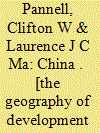

|
|
|
|
|
| Publication |
London, Edward Arnold Publishers Limited, 1983.
|
| Description |
ix, 342p.hbk
|
| Series |
Scripta Series in Geography
|
| Standard Number |
071316302X
|
|
|
|
|
|
|
|
|
|
|
|
Copies: C:1/I:0,R:0,Q:0
Circulation
| Accession# | Call# | Current Location | Status | Policy | Location |
| 023140 | 951/PAN 023140 | Main | On Shelf | General | |
|
|
|
|
| 3 |
ID:
115514
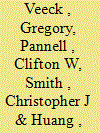

|
|
|
|
|
| Edition |
2nd
|
| Publication |
London, Rowman and Littlefield Publishers, 2011.
|
| Description |
xi, 381p.Hbk
|
| Standard Number |
9780742567825
|
|
|
|
|
|
|
|
|
|
|
|
Copies: C:1/I:0,R:0,Q:0
Circulation
| Accession# | Call# | Current Location | Status | Policy | Location |
| 056868 | 915.1/VEE 056868 | Main | On Shelf | General | |
|
|
|
|
| 4 |
ID:
046418
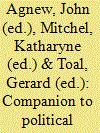

|
|
|
|
|
| Publication |
Malden, Blackwell Publishing, 2003.
|
| Description |
xii, 494p.
|
| Standard Number |
0631220313
|
|
|
|
|
|
|
|
|
|
|
|
Copies: C:1/I:0,R:0,Q:0
Circulation
| Accession# | Call# | Current Location | Status | Policy | Location |
| 046327 | 320.12/AGN 046327 | Main | On Shelf | General | |
|
|
|
|
| 5 |
ID:
049415
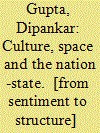

|
|
|
|
|
| Publication |
New Delhi, Sage Publications, 2000.
|
| Description |
282p.
|
| Standard Number |
0761994998
|
|
|
|
|
|
|
|
|
|
|
|
Copies: C:1/I:0,R:0,Q:0
Circulation
| Accession# | Call# | Current Location | Status | Policy | Location |
| 043816 | 306/GUP 043816 | Main | On Shelf | General | |
|
|
|
|
| 6 |
ID:
050670
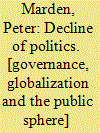

|
|
|
|
|
| Publication |
Aldershot, Ashgate Publishing Limited, 2003.
|
| Description |
xvi, 286p.
|
| Series |
Critical security series
|
| Standard Number |
0754617130
|
|
|
|
|
|
|
|
|
|
|
|
Copies: C:1/I:0,R:0,Q:0
Circulation
| Accession# | Call# | Current Location | Status | Policy | Location |
| 047671 | 327/MAR 047671 | Main | On Shelf | General | |
|
|
|
|
| 7 |
ID:
000612
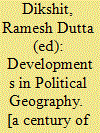

|
|
|
|
|
| Publication |
New Delhi, Sage Pub lication, 1997.
|
| Description |
xx, 387p.
|
| Standard Number |
0803993579
|
|
|
|
|
|
|
|
|
|
|
|
Copies: C:1/I:0,R:0,Q:0
Circulation
| Accession# | Call# | Current Location | Status | Policy | Location |
| 041868 | 320.12/DIK 041868 | Main | On Shelf | General | |
|
|
|
|
| 8 |
ID:
159214
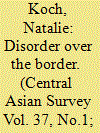

|
|
|
|
|
| Summary/Abstract |
Across Eurasia, authoritarian leaders have sought to justify their ‘strong-hand’ approach to government by framing instability as a security threat and the strong state as a guarantor of political stability. Such ‘regimes of certainty’ promote a modernist valorization of order, the flip side of which is a demonization of political disorder instability, or mere uncertainty. Examining the spatial and temporal imaginaries underpinning such narratives about in/stability in Central Asia, this paper compares official discourse in Kazakhstan and Uzbekistan, where state-controlled media and official publications have stigmatized political instability in Kyrgyzstan as indicative of the dangers of political liberalization and a weak state. Ostensibly about the ‘other’, these narratives are also about scripting the ‘self’. I argue that official interpretations of ‘disorder over the border’ in Kyrgyzstan are underpinned by a set of spatial and temporal imaginaries that do not merely reflect regional moral geographies, but actively construct them.
|
|
|
|
|
|
|
|
|
|
|
|
|
|
|
|
| 9 |
ID:
034443
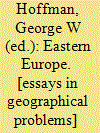

|
|
|
|
|
| Publication |
London, Methuen and co. ltd., 1971.
|
| Description |
xxviii, 502p.Hbk
|
| Standard Number |
416159907
|
|
|
|
|
|
|
|
|
|
|
|
Copies: C:1/I:0,R:0,Q:0
Circulation
| Accession# | Call# | Current Location | Status | Policy | Location |
| 006065 | 914.7/HOF 006065 | Main | On Shelf | General | |
|
|
|
|
| 10 |
ID:
039153
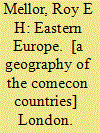

|
|
|
|
|
| Publication |
London, Macmillan Press Ltd, 1975.
|
| Description |
x, 358p.Hbk
|
| Standard Number |
333072987
|
|
|
|
|
|
|
|
|
|
|
|
Copies: C:1/I:0,R:0,Q:0
Circulation
| Accession# | Call# | Current Location | Status | Policy | Location |
| 014931 | 914.7/MEZ 014931 | Main | On Shelf | General | |
|
|
|
|
| 11 |
ID:
138967
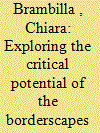

|
|
|
|
|
| Summary/Abstract |
The conceptual evolution of borders has been characterised by important changes in the last twenty years. After the processual shift of the 1990s (from border to bordering), in recent years there has been increasing concern about the need to critically question the current state of the debate on the concept of borders. Within this framework, this article explores the critical potential of the borderscapes concept for the development of alternative approaches to borders along three main axes of reflection that, though interrelated, can be analytically distinguished as: epistemological, ontological and methodological. Such approaches show the significant potential of borderscapes for future advances of critical border studies in the era of globalisation and transnational flows, thereby contributing to the liberation of (geo)political imagination from the burden of the ‘territorialist imperative’ and to the understanding of new forms of belonging and becoming that are worth being investigated.
|
|
|
|
|
|
|
|
|
|
|
|
|
|
|
|
| 12 |
ID:
178187
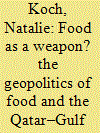

|
|
|
|
|
| Summary/Abstract |
On 4 June 2017, Qatar was suddenly put under an embargo by its regional neighbors – an effort spearheaded by Saudi Arabia and the UAE, who cut off most of its existing land, sea, and air traffic routes. With no domestic agriculture to speak of, Qatar’s external logistics networks are essential for maintaining its food supply. The country’s 2.6 million residents, many of whom flooded the grocery stores, were understandably concerned about their ability to secure food when news about the embargo broke. Eventually, new food supply chains were established, primarily with the assistance of partners in Iran and Turkey. The ongoing rift between Qatar and its neighbors in the Arabian Peninsula, manifested only in part by this effort to undermine the country’s material supply networks raises a number of questions about an old idea: that of food as a ‘weapon’. This article puts this concept in historical and regional perspective in the Arabian Peninsula through the lens of critical geopolitics, tracing the securitizing discourses about food security and their intertwining with narratives about territorial sovereignty, nationalism, and essentialist understandings of geography to explain the causes and effects of the food embargo in the ongoing Qatar–Gulf rift.
|
|
|
|
|
|
|
|
|
|
|
|
|
|
|
|
| 13 |
ID:
002294
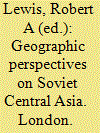

|
|
|
|
|
| Publication |
London, Routledge, 1992.
|
| Description |
xv, 323p, figures,maps,tablesHbk
|
| Series |
Studies of the Harriman Institute Series
|
| Contents |
Includes Index.
|
| Standard Number |
0415075920
|
|
|
|
|
|
|
|
|
|
|
|
Copies: C:1/I:0,R:0,Q:0
Circulation
| Accession# | Call# | Current Location | Status | Policy | Location |
| 033656 | 911.47/LEW 033656 | Main | On Shelf | General | |
|
|
|
|
| 14 |
ID:
039766
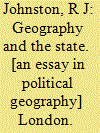

|
|
|
|
|
| Publication |
London, Macmillan Press Ltd., 1982.
|
| Description |
xii, 283p.Hbk
|
| Standard Number |
0333289692
|
|
|
|
|
|
|
|
|
|
|
|
Copies: C:1/I:0,R:0,Q:0
Circulation
| Accession# | Call# | Current Location | Status | Policy | Location |
| 021872 | 910.132/JOH 021872 | Main | On Shelf | General | |
|
|
|
|
| 15 |
ID:
160788
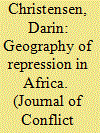

|
|
|
|
|
| Summary/Abstract |
I ask how the location of a protest affects how forcefully governments crack down. This geography of repression provides insight into a larger strategic problem: under what conditions do leaders meet protests with violence? I argue that protests in rural areas pose a smaller threat and, thus, prompt less frequent intervention. However, when governments decide to repress rural protests, they are less concerned that lethal repression might incite a backlash, as there are fewer bystanders in more rural areas that can join the fray. I uncover two patterns consistent with this theory: (1) repression is 30 percent more frequent in response to social conflicts in urban areas; but (2), if the state does employ repression, it is 75 percent more likely to kill dissidents in rural areas. The empirical relationships I report cannot be explained by reporting bias, international sanctioning, proximity to past armed conflicts, or the presence of natural resources.
|
|
|
|
|
|
|
|
|
|
|
|
|
|
|
|
| 16 |
ID:
005420
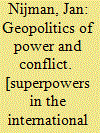

|
|
|
|
|
| Publication |
London, Belhaven Press, 1993.
|
| Description |
xv,160p.
|
| Standard Number |
1852932775
|
|
|
|
|
|
|
|
|
|
|
|
Copies: C:1/I:0,R:0,Q:0
Circulation
| Accession# | Call# | Current Location | Status | Policy | Location |
| 036738 | 327.101/NIJ 036738 | Main | On Shelf | General | |
|
|
|
|
| 17 |
ID:
074547
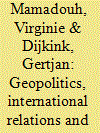

|
|
|
| 18 |
ID:
144472
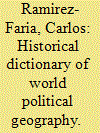

|
|
|
|
|
| Publication |
Houndmills, Palgrave, 2001.
|
| Description |
x, 447p.hbk
|
| Standard Number |
0333781775
|
|
|
|
|
|
|
|
|
|
|
|
Copies: C:1/I:0,R:1,Q:0
Circulation
| Accession# | Call# | Current Location | Status | Policy | Location |
| 044791 | 320.12/RAM 044791 | Main | On Shelf | Reference books | |
|
|
|
|
| 19 |
ID:
123707
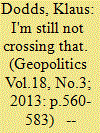

|
|
|
|
|
| Publication |
2013.
|
| Summary/Abstract |
This paper considers the film Frozen River (2008) for the purpose of considering how the US-Canadian border is dramatised within the context of two women caught up in a illicit trading of migrants via a Native American Reservation. Re-calibrating more mainstream Hollywood's fascination with the United States' southern border, Frozen River usefully focuses attention on two areas that deserve further reflection namely the materiality of borders and border crossings and biopolitics. The paper concludes with some reflections on how borders, biopolitics, dispossession and sovereignty need further theorization by political geographers and other scholars.
|
|
|
|
|
|
|
|
|
|
|
|
|
|
|
|
| 20 |
ID:
107694
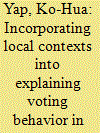

|
|
|
|
|
| Publication |
2011.
|
| Summary/Abstract |
Most electoral studies have "atomized" voters, detaching them from their local contexts. To provide evidence that local context does matter in voting behavior in Taiwan, this study will combine individual and ecological data relating to the Taiwan presidential election of 2004. The results show that both local ethnic composition and the economic situation of a township ran influence the voting behavior of residents. First, people who identify themselves as Taiwanese are more likely to vote DPP, while the higher the percentage of Hohlo there is in a township, the more likely its residents are to identify themselves as Taiwanese, and conversely, the higher the percentage of mainlanders, the less likely residents are to identify themselves as Taiwanese. Second, residents educated to senior high school-level or above are more likely to vote DPP in more affluent townships, while those educated to junior high school-level or below are more likely to vote DPP in more deprived townships. These findings suggest that similar people vote differently in different places.
|
|
|
|
|
|
|
|
|
|
|
|
|
|
|
|
|
|
|
|
|